
Marine Intellectual Technologies
Scope & Guideline
Unleashing potential through open-access marine innovations.
Introduction
Aims and Scopes
- Marine Engineering and Structural Integrity:
Research on the design, analysis, and optimization of marine structures, including hulls and propulsion systems, focusing on strength, stability, and material properties. - Hydrodynamics and Fluid Mechanics:
Studies related to fluid dynamics affecting marine vessels, including resistance, wave interactions, and hydrodynamic forces, aimed at improving vessel performance. - Autonomous and Intelligent Systems:
Development of intelligent systems for navigation, control, and monitoring of marine vehicles, including autonomous underwater vehicles (AUVs) and unmanned surface vessels. - Environmental Safety and Sustainability:
Research on ecological impacts of marine operations, including pollution management, environmental assessments, and sustainable practices in marine transport. - Numerical Modeling and Simulation Techniques:
Application of computational methods and simulations for analyzing marine systems, including structural analysis, fluid dynamics simulations, and predictive modeling. - Innovative Materials and Technologies:
Exploration of advanced materials, such as polymer composites, and their applications in marine technology to enhance performance and durability.
Trending and Emerging
- Digital Transformation in Marine Technology:
A significant trend towards digitalization, including the use of IoT and AI in marine systems for improved efficiency and safety, is becoming prominent. - Environmental Impact Mitigation:
Increased focus on technologies and methodologies aimed at reducing environmental impacts from marine operations, aligning with global sustainability goals. - Advanced Simulation Techniques:
Growing emphasis on sophisticated simulation methodologies, particularly in predicting vessel behavior under various conditions and optimizing design processes. - Robotics and Automation in Marine Operations:
Emerging interest in the integration of robotics and automation in marine tasks, including underwater exploration and maintenance, enhancing operational capabilities. - Alternative Energy Solutions:
Research into alternative energy sources and their applications in marine environments is on the rise, reflecting a shift toward greener technologies. - Cybersecurity in Marine Systems:
As marine systems become more interconnected, there is an increasing focus on cybersecurity measures to protect against potential threats to marine operations.
Declining or Waning
- Traditional Shipbuilding Techniques:
There has been a noticeable decline in research focused on conventional shipbuilding methods, as emphasis shifts towards innovative and automated processes. - Basic Maritime Safety Regulations:
Research centered on standard maritime safety regulations appears to be waning, potentially due to the increased focus on advanced technology and automated safety systems. - Conventional Fuel Systems:
Studies related to traditional marine fuel systems are decreasing, likely due to a growing interest in alternative fuels and energy-efficient technologies. - Static Structural Analysis:
Focus on static structural analysis without dynamic considerations is diminishing, as researchers prioritize dynamic responses and real-world operational conditions. - Basic Marine Engineering Education:
Research that solely addresses foundational aspects of marine engineering education is declining, as the field increasingly emphasizes interdisciplinary and advanced technological integration.
Similar Journals

JOURNAL OF OCEANOGRAPHY
Fostering Interdisciplinary Insights in OceanographyJOURNAL OF OCEANOGRAPHY, published by Springer, stands as a leading academic journal in the field, with an impressive Q1 ranking in Oceanography for 2023. Since its inception in 1992, this journal has dedicated itself to the dissemination of high-quality research that spans a diverse array of topics within oceanography and earth sciences. With an ISSN of 0916-8370 and an E-ISSN of 1573-868X, it plays a crucial role in bridging the gap between academia and practical marine applications. The journal is indexed in Scopus, ranking #57 out of 145 in its category, reflecting its rigorous academic standards and the impact of its published works, reaching a notable ile in the 61st percentile. Located in Japan, the JOURNAL OF OCEANOGRAPHY provides a vital platform for sharing significant research findings that contribute to our understanding of marine environments, aiming to foster interdisciplinary collaboration among researchers, professionals, and students dedicated to marine science.
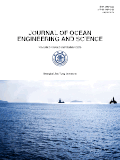
Journal of Ocean Engineering and Science
Transforming marine environments through cutting-edge research.The Journal of Ocean Engineering and Science, published by Elsevier, is a prominent academic journal dedicated to advancing the field of ocean engineering and environmental sciences. Since its inception as an Open Access journal in 2016, it has rapidly gained recognition, achieving significant impact factor ratings with notable placements in the prestigious Q1 category for Ocean Engineering and Oceanography, and Q2 for Environmental Engineering in 2023. With a remarkable ranking of #3 out of 105 in Ocean Engineering and #4 out of 145 in Oceanography according to Scopus, the journal plays a critical role in disseminating cutting-edge research and innovative solutions addressing complex challenges faced by marine environments. Operating from Amsterdam, Netherlands, the Journal of Ocean Engineering and Science invites contributions from researchers, professionals, and students worldwide, emphasizing the importance of interdisciplinary approaches in achieving sustainable maritime practices.
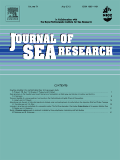
JOURNAL OF SEA RESEARCH
Exploring the Depths of Aquatic KnowledgeJOURNAL OF SEA RESEARCH, published by Elsevier, is a premier academic journal dedicated to advancing knowledge in the fields of aquatic science, ecology, and oceanography. Since its inception in 1996, this journal has provided a vital platform for researchers and professionals to disseminate groundbreaking findings and promote fostering interdisciplinary discussions. With its impressive Q2 ranking in multiple categories, including Aquatic Science and Ecology, Evolution, Behavior and Systematics, it positions itself as a significant contributor to marine and environmental studies. The journal is accessible in both print (ISSN: 1385-1101) and online formats (E-ISSN: 1873-1414), ensuring wide reach and engagement within the scholarly community. Researchers and students alike will find the journal not only a reliable source of information but also a source of inspiration for future explorations. With a commitment to quality and a broad scope that spans fundamental to applied research, JOURNAL OF SEA RESEARCH remains an indispensable resource for understanding the complexities of marine environments and their relevance to our changing world.
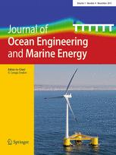
Journal of Ocean Engineering and Marine Energy
Bridging Academia and Industry for Marine SustainabilityJournal of Ocean Engineering and Marine Energy, published by SpringerNature, stands at the forefront of interdisciplinary research within the fields of ocean engineering and marine energy. Since its inception in 2015, this journal has aimed to address critical challenges and innovations in energy systems, particularly those harnessed from marine environments, thereby contributing to sustainable development and efficient resource management. With an esteemed Q2 ranking in multiple categories such as Energy Engineering and Power Technology, and Ocean Engineering, the journal serves as a vital platform for researchers, professionals, and students seeking to disseminate and engage with cutting-edge research and technological advancements. Boasting a robust readership and a commitment to open-access principles, the journal fosters a collaborative environment for the exploration of new ideas and approaches in a rapidly evolving sector. By bridging the gap between academia and industry, Journal of Ocean Engineering and Marine Energy remains instrumental in shaping the future of renewable energy solutions and environmental sustainability.

Research in Marine Sciences
Unveiling the secrets of the seas through rigorous research.Research in Marine Sciences, ISSN 2538-5542, is a leading journal published by ARMAN DARYA INC, specializing in the dynamic and interdisciplinary field of marine science. With a commitment to advancing knowledge in areas such as marine ecology, oceanography, and marine conservation, this journal provides a collaborative platform for researchers, professionals, and students to disseminate their findings. Although it operates under a traditional subscription model, the journal ensures that the latest research is accessible to a wide audience, promoting the understanding of marine environments crucial for biodiversity and sustainability. The journal aims to bridge the gap between theoretical research and practical applications, emphasizing the need for rigorous studies that address pressing marine issues in a rapidly changing world. By contributing to the body of literature in marine sciences, Research in Marine Sciences plays a vital role in shaping the future of marine research and policy-making.

Ocean Systems Engineering-An International Journal
Showcasing Cutting-edge Advances in Marine and Mechanical EngineeringOcean Systems Engineering - An International Journal, published by TECHNO-PRESS, is a pivotal platform for the dissemination of cutting-edge research in the fields of Automotive Engineering, Mechanical Engineering, Ocean Engineering, and Water Science and Technology. With its ISSN 2093-6702 and E-ISSN 2093-677X, the journal serves as a key resource for scholars and practitioners alike, offering insights into innovative solutions and advancements within these disciplines. Operating under a Q3 ranking in several categories including Automotive and Ocean Engineering, the journal showcases research that significantly contributes to both theoretical and practical aspects of engineering and environmental science. Although it does not currently offer an open-access model, the journal maintains an active presence in the academic community, supported by a dedicated readership keen on exploring the latest developments from 2017 to 2024. Situated in South Korea, it is uniquely positioned to bridge international research efforts and enhance collaborative studies aimed at addressing critical ocean-related challenges.
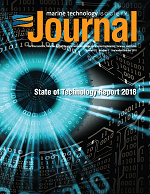
MARINE TECHNOLOGY SOCIETY JOURNAL
Charting New Waters in Marine Technology ResearchMARINE TECHNOLOGY SOCIETY JOURNAL, published by the Marine Technology Society, Inc., serves as a critical forum for advancing the field of marine engineering and oceanography. With a rich history dating back to its inception in 1969 and continuing through various converged years until 2024, this journal is recognized for its contributions to the understanding of marine technologies and their applications. It currently holds a notable Q3 ranking in both Ocean Engineering and Oceanography, as per the 2023 metrics, underscoring its significance in these domains. Although access is not open, the journal rigorously assesses and publishes high-quality research articles, technical notes, and reviews that engage a wide readership of researchers, industry professionals, and students alike. With the journal's aim to disseminate innovative findings and foster dialogue within the marine community, it promises to be an essential resource for anyone looking to explore the dynamic field of marine technology.

Journal of Ocean University of China
Advancing Ocean Science for a Sustainable FutureThe Journal of Ocean University of China, ISSN 1672-5182, is a premier academic journal dedicated to advancing the fields of Ocean Engineering and Oceanography. Published by the esteemed Ocean University of China, the journal serves as a vital platform for researchers, professionals, and students to disseminate groundbreaking findings and foster collaboration in marine science and engineering. With a commitment to quality, the journal currently holds a Q3 ranking in both Ocean Engineering and Oceanography as of 2023, indicating its significant contributions within the scientific community. The journal's scope encompasses a wide range of topics including marine technology, ecological studies, and coastal management, all aimed at enhancing the understanding and utilization of oceanic resources. Although currently not Open Access, it continues to attract submissions from renowned scholars, ensuring a diverse and innovative range of research. By providing access to cutting-edge research and practical insights, the Journal of Ocean University of China plays a critical role in shaping the future of ocean sciences and engineering.

MARINE GEORESOURCES & GEOTECHNOLOGY
Integrating Science and Engineering Beneath the WavesMARINE GEORESOURCES & GEOTECHNOLOGY, published by Taylor & Francis Inc, is a premier interdisciplinary journal that addresses critical issues at the intersection of geosciences, engineering, and oceanography. With an ISSN of 1064-119X and E-ISSN 1521-0618, this journal has been pivotal since its inception in 1993, delivering high-quality research through 2024. Recognized for its scholarly impact, it boasts a Q2 ranking in key categories including Geotechnical Engineering, Ocean Engineering, and Oceanography, demonstrating its significance within these fields. The journal features a dynamic range of articles, encompassing both theoretical and application-based studies that contribute to understanding marine resources and geotechnical challenges in various environments. Engaging with MARINE GEORESOURCES & GEOTECHNOLOGY ensures that researchers, professionals, and students remain at the forefront of developments in marine science and technology, while fostering collaboration and innovation in tackling complex geological and oceanographic problems.
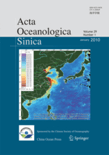
ACTA OCEANOLOGICA SINICA
Advancing Oceanographic Knowledge Since 1985ACTA OCEANOLOGICA SINICA, published by SPRINGER, stands as a significant voice in the fields of Aquatic Science and Oceanography, contributing vital research and insights since its inception in 1985. With an ISSN of 0253-505X and an E-ISSN of 1869-1099, this journal maintains a strong international focus, delivering high-quality peer-reviewed articles that address pressing marine and freshwater environmental issues. Although it operates under a subscription model, its Q3 ranking in both Aquatic Science and Oceanography demonstrates its solid standing within Scopus, placing it in the 48th and 44th percentiles respectively. The journal aims to foster knowledge exchange and collaboration among researchers, professionals, and students by providing a platform for innovative studies and comprehensive reviews. With a dedicated editorial board and a commitment to advancing scientific understanding, ACTA OCEANOLOGICA SINICA serves as an essential resource for anyone engaged in the study of oceanographic phenomena and aquatic ecosystems.